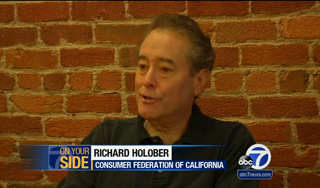Tag Archives: Online Privacy
Uber Data Collection Changes Should Be Barred, Privacy Group Urges
by Natasha Singer and Mike Isaac, The New York Times
A leading privacy rights group wants the Federal Trade Commission to prohibit Uber from instituting changes to its privacy policy that the group says will allow the ride-hailing app to collect more detailed data about customers’ whereabouts and use their contact lists to send their friends promotional pitches. … Uber’s reputation is still recovering from public censure last year after allegations surfaced that company employees had mishandled trip data about individual consumers to track their locations, and inappropriately shared an internal tool — colloquially known as “God view” — that showed users taking trips in real time. Read More ›
Verizon’s Super-Cookies Are A Super Privacy Violation
by David Lazarus, Los Angeles Times

Verizon is informing customers that they can opt out of having their personal information shared by visiting the company’s MyVerizon website. But here’s something Verizon is neglecting to mention. Any visit to MyVerizon will result in — you guessed it — a cookie being generated for your computer or wireless device that will automatically enroll you in what Verizon calls its Relevant Mobile Advertising program, which oversees all online tracking. Think about that: Verizon will violate your privacy even as you go through the steps the company has set up to protect your privacy. Read More ›
FTC Calls For Strong Data And Privacy Protection With Connected Devices
by Natasha Singer, The New York Times

Last year, for instance, an electronics company that marketed what it said were “secure” Internet-connected cameras, allowing parents to remotely monitor their babies, settled a complaint by the F.T.C. that lax security practices had exposed its customers to privacy invasions. A security flaw allowed anyone with the cameras’ Internet addresses to view, and in some cases hear, what was happening in customers’ homes. Read More ›
CES: Security Risks From The Smart Home
by Molly Wood, The New York Times

LAS VEGAS — The Internet of Things arrived in force at this year’s International CES, the huge trade show here. But while manufacturers at the event painted a rosy picture of connected grills, coffee makers, refrigerators and door locks, security experts and regulators warned that the Internet of Things could be a threat to both security and privacy. … Perhaps because connected devices are relatively new, there are few security features built into many of them or the apps and services that power them. Even fewer products exist to lock down your smart home. Read More ›
New ‘Super Cookies’ Can Track Your Private Web Browsing — And Apple Users Can’t Get Rid Of Them
by Rob Price, provided by Business Insider, San Francisco Chronicle

[Security researcher Sam] Greenhalgh says that Apple’s Safari web browser is especially vulnerable to the exploit. While clearing cookies on Mozilla’s Firefox, Google Chrome or Opera also erases HSTS flags, deleting the super cookies, there’s no way to do so on Safari on iOS devices. This means that if you’ve had super cookies placed on your iPad or iPhone, there’s effectively no way to get rid of them short of reformatting the entire machine. Read More ›
New Law Cracks Down On Spyware
by Michael Finney, KGO-TV San Francisco

A new law in California that took effect January 1 limits the ability of rent-to-own companies to install spyware that could monitor a customer’s every move. …”It’s outrageous, you know when you are renting a computer you’re not giving permission to the rental company to capture all the information including your emails, and even pictures of you,” said Richard Holober, Executive Director of the Consumer Federation of California. The Consumer Federation of California successfully sponsored state legislation banning the practice without first notifying the consumer. Read More ›
Hacked vs. Hackers: Game On
by Nicole Perlroth, The New York Times

The impact on consumers has been vast. Last year, over 552 million people had their identities stolen, according to Symantec, and nearly 25,000 Americans had sensitive health information compromised — every day — according to the Department of Health and Human Services. Over half of Americans, including President Obama, had to have their credit cards replaced at least once because of a breach … . But if there is a silver lining to the current predicament … security experts say it is that computer security, long an afterthought, has been forced into the national consciousness. Read More ›
The Creepy New Wave of the Internet
by Sue Halpern, The New York Review of Books

Apple offered a glimpse of how the Internet of Things actually might play out, when it introduced the company’s new smart watch, mobile payment system, health apps, and other, seemingly random, additions to its product line. As Mat Honan virtually shouted in Wired: “Apple is building a world in which there is a computer in your every interaction, waking and sleeping. … telling you how many steps you took, how high you climbed and how many calories you burned. … THIS IS THE NEW APPLE ECOSYSTEM. APPLE HAS TURNED OUR WORLD INTO ONE BIG UBIQUITOUS COMPUTER.” Read More ›
FTC Says Privacy Certification Company Was Deceptive
by John M. Simpson, Consumer Watchdog
TRUSTe agreed to stop the deceptive practices and disgorge $200,000. “TRUSTe promised to hold companies accountable for protecting consumer privacy, but it fell short of that pledge,” said FTC Chairwoman Edith Ramirez. “Self-regulation plays an important role in helping to protect consumers. But when companies fail to live up to their promises to consumers, the FTC will not hesitate to take action.” I’ve got a little different takeaway: Self-regulation doesn’t work. Read More ›
More Cracks in Google’s ‘Don’t Be Evil’ Mantra as Data Collection, Political Power Soar
by Deirdre Fulton, Common Dreams
The combination of expanding technology and exploding political influence could be dangerous, Public Citizen warns. “Google has essentially responded to concerns about its practices by saying ‘just trust us’,” said Taylor Lincoln, research director of Public Citizen’s Congress Watch division and editor of the report. “But Google is gaining so much power that regulators may find it difficult to act if it turns out that the public’s trust has been misplaced.” Read More ›
Americans Say They Want Privacy, but Act as if They Don’t
by Claire Cain Miller, The New York Times
Pew offered some evidence that people are inured to the trade-offs of using digital services: Ninety-one percent agree or strongly agree that consumers have lost control over how their personal information is collected or used by companies. They are unsure what to do about it, though. Nearly two-thirds say they would like to do more to protect the privacy of their personal information online. About the same number think the government should do more to protect them. Read More ›
Apple Mobile Devices Vulnerable To App Attack, FireEye Says
by Jeremy C. Owens, San Jose Mercury News

Apple mobile devices can leak users’ information through an attack using apps distributed outside the company’s App Store, a prominent Silicon Valley security company disclosed Tuesday. … Hackers could offer a mobile app through the Web that would mimic a legitimately downloaded application on a user’s device, siphoning important information such as login info or emails. An example provided showed that a third-party app called “New Flappy Bird” could replace the Gmail app and access cached emails, using the same “bundle identifier” that Apple uses for the Gmail app. Read More ›
Internet of Things Will Transform Life, But Experts Fear for Privacy
by Steve Johnson, San Jose Mercury News

Although people already reveal much about themselves through their Internet searches and social media posts, that’s nothing compared with the trove of personal data likely to be disclosed by the Internet of Things. … The personal data revealed could include everything from your friends, hobbies and daily routines to your political views, religious affiliation and even your sexual activities. Your politics might be disclosed if you routinely watch like-minded programs on your Web-connected TV and use your personal robot’s videoconferencing capabilities for online meetings with a group that shares your views. Read More ›